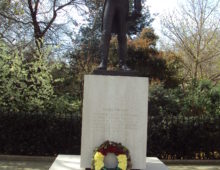Tagged with Suffrage
Resource : Banner from the “Peterloo Massacre”
On the 16th August 1819, a huge crowd of people gathered in St Peter’s Field, Manchester to hear Henry ‘Orator’ Hunt and other noted radical speakers calling for parliamentary reform. At least 17 people would die of injuries received on the day, and around 700 suffered serious wounds at the hands of local armed forces. There was a popular outcry, and the radical press named the incident the ‘Peterloo Massacre’, a mocking reference to the Battle of Waterloo.
Resource : Poster advertising the Chartists’ Demonstration on Kennington Common, 1848
The Chartists were members of a national and generally peaceful protest movement who campaigned between 1838 and 1857 for political reform and representation of working class people. It was the first British mass movement to be driven by the working classes. The development of the industrial printing press helped spread the word and gather support for peaceful protests. The Chartists’ ‘demands’ still underpin British democracy today.
Resource : Welsh project digitises documents from the Newport Chartist Uprising of 1839
May 7, 2019 - Richard Moss
This fascinating project, which launched in 2016 in Wales, has seen volunteers working to transcribe more than 3,000 important documents gathered together shortly after the famous Newport Chartist Rising of November 3rd and 4th 1839. Unlocking the Chartist Trials uses online volunteers to transcribe the court records relating to the famous Rising, which is cited […]
Resource : Silhouette of Thomas Muir
Thomas Muir was a radical, who campaigned for political reform in Scotland. He was eventually accused of sedition and transported to Australia, following one of the most notorious and controversial trials in Scottish history. He became known as the father of Scottish democracy and one of Scotland’s five ‘political martyrs’.
Resource : Skelmanthorpe Flag
The 1800s saw a series of protests and uprisings in Britain, as people campaigned against slavery, unjust taxes and laws imposed by the government and in support of fair wages, the right to vote and to have their voices heard in parliament. Protest flags, posters and banners carrying radical slogans were a popular way for campaigners to get their message across at marches and rallies, and to cooperate without endangering individuals. The Skelmanthorpe flag was created in secret, in Huddersfield, initially to honour the victims of what became known as the Peterloo Massacre, in 1819.


